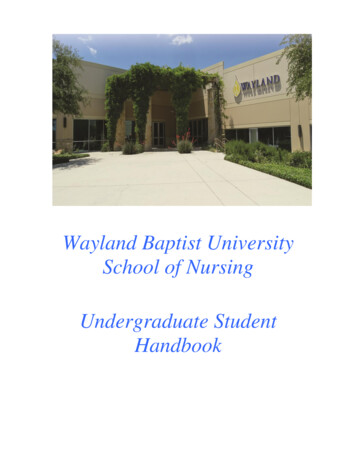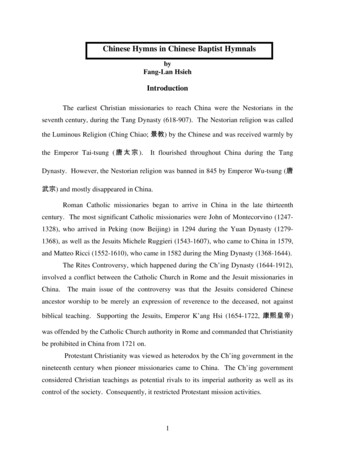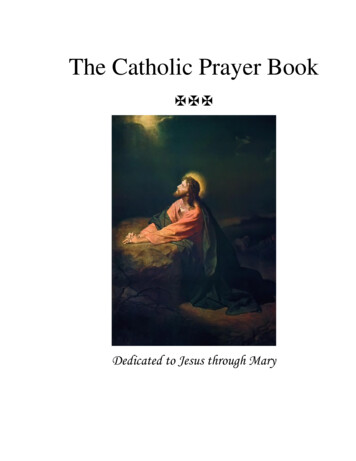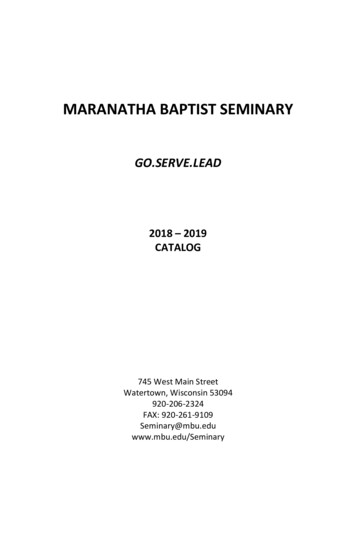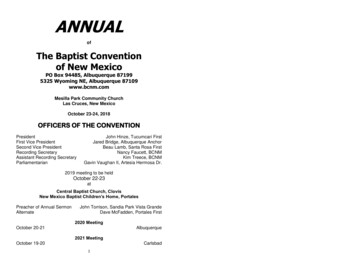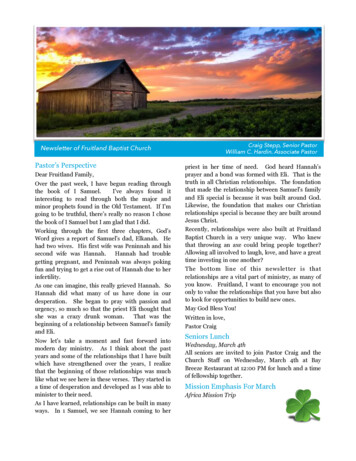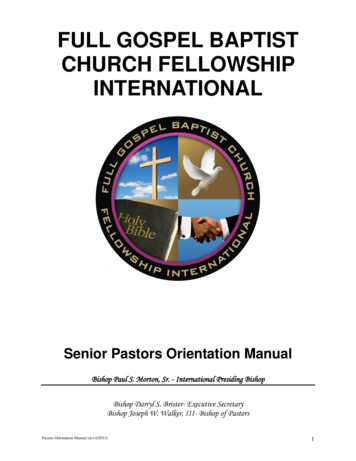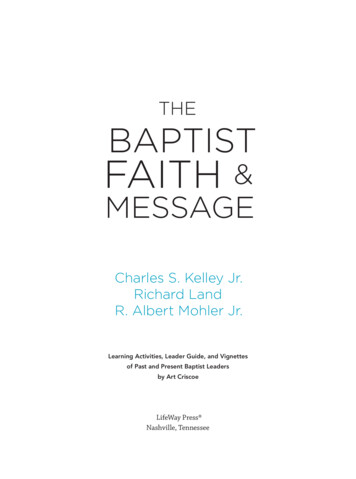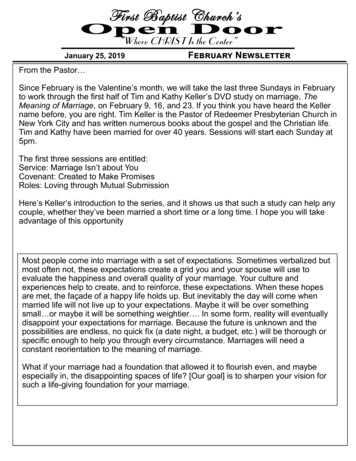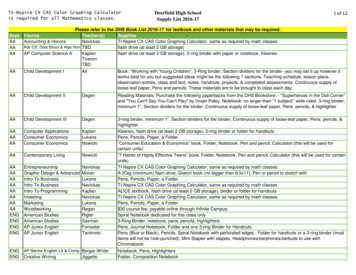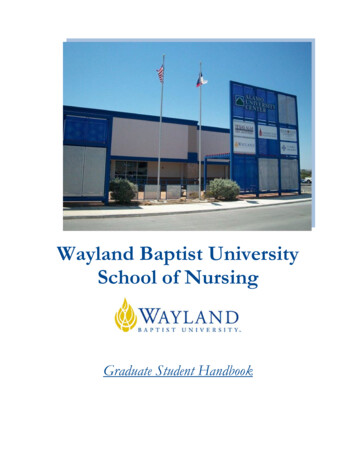
Transcription
Wayland Baptist UniversitySchool of NursingGraduate Student Handbook
Table of ContentsMission Statement .3Program outcomes of the MSN program . .3Admissions/International Admission .4Admissions Process .4Nursing Course Descriptions .5Nursing Student Conduct .6Discipline Policy . .7Substance Abuse Policy .12University Sanctions .12Holidays .14Semesters .14Withdrawal from the University .14Registration .15Transfer Policy .16Class Attendance .16Requirements for the master’s degree . .17Annual Notification of Rights Under Family Educational Rights & Privacy Act .17Directory Information. .18Students Grade Appeals .19Academic integrity .22Plagiarism .24Library and Research Resources .24Textbooks .25Course Evaluations .25Institute for Professional Development .26Disabled Students Policy .26Discrimination . .26Student Grievance Policy .27Sexual Harassment .27Information Technology and Telecommunication Services .27Accessing Your WBU EMAIL .292
Mission StatementThe School of Nursing mission statement is based on the values and beliefs of theWayland Baptist University mission. The mission of Wayland Baptist University Schoolof Nursing is to educate students in a Christian environment. The goal is to preparegraduates who provide holistic nursing care at both beginning and advanced practicelevels, in a diverse healthcare world. The school prepares graduates who are committedto providing excellent; evidence based patient care, teaching, service, and outreach.Program Outcomes of the MSN ProgramUpon completion of graduate study in nursing, the students will: Develop nursing education curricula that fosters best practice and producesnursing graduates that are capable of practicing professional nursingImplement a variety of teaching strategies based on desired outcomesApply reliable and valid methods to assess and evaluate student learningoutcomesFunction as a leader and change agent in the field of nursing educationApply principles and best practices of adult learning to meet the needs of diversestudentsSelect teaching strategies that are supported by theory and best practicesApply effective classroom management strategiesShare knowledge of nursing education issues and best practices with students andthe broader nursing education communitiesPractice within the legal and ethical parameters of higher educational institutionsand nursing education systemsContribute to the philosophy and science of nursing education systems tomaintain quality and adopt best practices to improve nursing educationProvide nursing education settings that support students’ ability to demonstratethe essential knowledge and skills required of a nurse educatorDemonstrate the ability to carry out selected administrative responsibilities in anursing education programAdmissions:Master of Science in Nursing (M.S.N.)Students must have graduated with a Bachelor of Science in Nursing from a program thathas been accredited either by the Accreditation Commission for education in Nursing orthe Commission on Collegiate Nursing Education.3
International Student AdmissionIn addition to requirements listed above, an international student must meet with anacademic advisor and have on file at the IG-35 location the following documents prior toapplying for admission:1. The TOEFL exam. A student whose native language is not English must take theTest of English as a Foreign Language (TOEFL). A minimum score of 500 isrequired for unconditional admission.2. An affidavit of Support. The U.S. Immigration and Naturalization Service andthe University require all international applicants to provide an “Affidavit ofSupport” form certifying ability to finance study in the United States.Verification of support sufficient for completing two semesters at WaylandBaptist University School of Nursing School of Nursing School of Nursing isrequired.3. A valid Student Visa issued by the U.S. government.Admissions Process:Students desiring to enter the graduate program must submit the following documents:1. A completed graduate application for admission.2. An application fee of 50 (non-refundable). Any student who previously paid anapplication fee for undergraduate or graduate degree seeking status is exemptfrom this fee.3. Official transcripts from each institution attended.4. Application files will not be evaluated until all of the above requirements havebeen met.5. Wayland will consider for admission those students with earned degrees frominstitutions accredited by an agency recognized by the Council of HigherEducation Accreditation and the U.S. Department of Education. Students withearned degrees from verified international institutions will also be considered.6. Students may apply a maximum of four times for admission to the graduateprogram.7. Before any clinical immersions, students must meet the requirements of thefacility.Admission Appeal:An applicant may appeal an admission decision to the graduate council. The appealshould be routed through the external campus executive director/dean or through the vicepresident of external campuses and graduate studies on the Plainview campus.Financial Aid:Graduate student financial aid eligibility is contingent upon the category assigned thestudent. Programs available for funding for graduate study include the Federal Family4
Education Loan Program, Federal Perkins Loan Program, Tuition Equalization Grant,Federal Work Study Program, and Institutional Scholarships.Nursing Course Descriptions:The Masters in Nursing requires completion of 36 hours of course work. A three hourpracticum course is required with a preceptorship that has been approved by the facultyteaching the course.NURS 5308 Curriculum Development in Nursing Education – This course introducesthe learner to processes involved in developing nursing curricula in baccalaureate,associate degree, and diploma nursing education. The emphasis is on analysis,interpretation, development of a philosophy and total program evaluation.NURS 5309 Teaching Strategies in Nursing – provides the learner with knowledgenecessary for competent classroom and clinical teaching. Methods of teaching students atthe university, community college, and healthcare settings in classroom, seminar andelectronic formats are explored.NURS 5310 Evaluation of Learning in Nursing Education – provides the learner withevaluation tools and methods for evaluation in classroom and clinical settings for nursingstudents in all levels of higher education. The learner will gain knowledge in differenttypes of test taking and assessments of higher level learning.NURS 5311 Role Development in Nursing Leadership – allows the learner to gainknowledge of the leadership roles specific to nursing and to develop professionalleadership skills necessary to be successful in nursing practice.NURS 5312 Foundations of Adult Learning in Nursing Education – Introducesconcepts of adult development and how adults learn and explore the different learningstyles necessary to develop critical thinking and safe nursing practice in a student.NURS 5314 Applied Learning Theories in Nursing Education – Explores majorresearch-based theories of adult learning and the application of these theories to nursingeducation.NURS 5313 Classroom Management in Nursing Education – Investigation of themajor theories of classroom management and classroom skills for the nurse educators usein the management of the classroom to develop critical thinking skills and safe patientcare in the practice setting.NURS 5306 Research Methods in Nursing Education – development of research skillsappropriate for educational and instructional environments in nursing education.5
NURS 5307 Legal and Ethical Issues in Nursing Education – Examination of the legaland ethical issues that affect the delivery of quality nursing education to nursing studentsby the nurse educator.NURS 5301 Organizational Structure and Systems Leadership in Nursing –introduces the theories of organizational structure and how to identify effective structurewithin an organization, such as institutions of higher education or clinical facilities.Identifies qualities of effective leaders within an organizational structure by identifyingpractices and leadership skills specific to nursing.NURS 5360 Practicum – this nursing practicum experience is designed to integratetheory in a reality context of the teaching role. Opportunities are provided for teaching inthe classroom, clinical setting, and healthcare educational setting.BUAD 5302 Foundations of Economics and Finance Theory and Practice – elementsof economics, finance, and quantitative methods. Transcripts evaluated to determinerequirement.Nursing Student ConductSome of the standards of conduct expected of a Wayland Baptist University School ofNursing student are: Personal integrity in keeping with New Testament standards.Respect for the property, knowledge, and rights of other people.Behave him/her in such a manner as to uphold, not detract from, the good name ofWayland Baptist University School of Nursing.Improper behavior includes cursing, gossip, or other language that is abusive oroffensive to others.(a) Good professional character is the integrated pattern of personal, academic andoccupational behaviors which, in the judgment of the Board, indicates that an individualis able to consistently conform his or her conduct to the requirements of the NursingPractice Act, the Board's rules and regulations, and generally accepted standards ofnursing practice including, but not limited to, behaviors indicating honesty,accountability, trustworthiness, reliability, and integrity.(b) Factors to be used in evaluating good professional character in eligibility anddisciplinary matters are:(1) Good professional character is determined through the evaluation of behaviorsdemonstrated by an individual in his or her personal, academic and occupational history.An individual's age, education, and experience necessarily affect the nature and extent ofbehavioral history and, therefore, shall be considered in each evaluation.(2) A person who seeks to obtain or retain a license to practice professional orvocational nursing shall provide evidence of good professional character which, in thejudgment of the Board, is sufficient to insure that the individual can consistently act in6
the best interest of patients/clients and the public in any practice setting. Such evidenceshall establish that the person:(A) is able to distinguish right from wrong;(B) is able to think and act rationally;(C) is able to keep promises and honor obligations;(D) is accountable for his or her own behavior;(E) is able to practice nursing in an autonomous role with patients/clients, theirfamilies, significant others, and members of the public who are or who may becomephysically, emotionally, or financially vulnerable;(F) is able to recognize and honor the interpersonal boundaries appropriate to anytherapeutic relationship or health care setting; and(G) is able to promptly and fully self-disclose facts, circumstances, events, errors, andomissions when such disclosure could enhance the health status of patients/clients or thepublic or could protect patients/clients or the public from unnecessary risk of harm.Any behavior deemed unprofessional in the classroom or in the clinical area can lead toimmediate dismissal from the program by the Dean. This includes any act that could beconsidered unsafe practice.Discipline PolicyIntroductionThe purpose of the university discipline policy and system is to encourage appropriatebehavior, discourage inappropriate behavior and ensure a safe, comfortable andeducationally sound campus environment. The system is not primarily punitive, butrather educational in intent, although sanctions on certain behaviors violate universitystandards of conduct.I. Judicial CouncilA. The Judicial Council shall be made up of a representative from each occupiedresidence hall to be elected at the first residence hall meeting of the school year, an offcampus student to be appointed by the Dean of Students, five faculty members to bechosen by the faculty assembly and two staff members to be chosen by the ExecutiveVice President. The Dean of Students will be an ex-officio member of the council andwill not have a vote in disciplinary decisions but will be available to the council forreference. Alternates for each position will be selected at the same time and in the samefashion as the members.B. Hearing times will be scheduled by the Dean of Students.C. The council shall rule on all matters referred by the Dean of Students. It is the intentof this policy that disciplinary matters be resolved at the lowest appropriateadministrative level possible. Referral to the next higher level for ruling will be at thediscretion of university officials. Students may request that rulings and sanctions be7
appealed through the administration as stated in the section of this document entitled“Appeals.”D. Votes will be taken by secret ballot of “guilty” or “not guilty.” A guilty verdict willrequire a 75% vote of members present. Decision will be made based on the greaterweight of credible evidence.The council will render a verdict and recommend appropriate sanctions to theDean of Students. The Dean of Students will notify the student of the council’s decisionand enforce the sanction(s) with or without modification.II. JurisdictionA. Any student enrolled at Wayland Baptist University for any number of hours issubject to this policy and by enrolling is agreeing to abide by the standards set forth inthis document.B. In the case of a student charged with a violation of the city, county, state or federalcriminal or civil code, disciplinary actions by the university need not be delayed untilsuch charges are resolved. The university may sanction a student although charges havebeen dropped or the student has been acquitted through the legal system.C. Students who are registered or pre-registered for attendance at Wayland are subject topossible disciplinary actions by the university although they may not be in actualattendance at the time of the violation. Proskpective3 students may have enrollmentblocked for serious violations prior to actual enrollment or attendance.D. Students in violation of the university’s standards of conduct while off campus maybe subject to disciplinary action by the university if deemed appropriate by universityofficials. Violations related to or in conjunction with university activities or functionswill be considered on-campus violations.E. All cases of academic dishonesty, cheating or plagiarism will be handled by theacademic division and the Executive Vice President/Provost. Cases may be referred tothe Dean of Students if deemed necessary by the Executive Vice President/Provost.III. Conduct StandardsThe following behaviors may be grounds for probation, suspension or expulsion from theuniversity: Alcohol or illegal drug use, possession or distribution as outlined in the StudentSubstance Abuse PolicyPremarital or extra-marital sexual relations or cohabitation on university propertyor in conjunction with university activities or functionsTheft, destruction or vandalism of property8
Unauthorized use of university propertyUnauthorized possession of university keys, or other security breachPhysical threat or assaultGamblingPossession of firearms on campusPossession of drug paraphernaliaCheating, plagiarism or academic dishonestyFailure to comply with other conduct standards as set forth in universitypublications or by university officialsRecurrence of lesser offensesOther behaviors which may be deemed as harmful or disruptive to the universitycommunity or the educational processIV. SanctionsA. The University allows for a wide range of possible disciplinary sanctions including,but not limited to fines, loss of privileges, restitution, and informal probation, loss ofscholarship, suspension and expulsion. Sanctions for alcohol, illegal drug or inhalant usewill be imposed in accordance with the Student Abuse Policy adopted by the Board ofTrustees (1990).B. Students have the right to plead innocence, and this will not be held against thestudent in the case of a guilty verdict. Students will, however, be expected to cooperatefully with university officials and the Judicial Council and comply with their requests.Lack of cooperation and compliance may have bearing on sanctions imposed.C. Each disciplinary issue will differ in circumstance, severity and situation.Accordingly, differing sanctions may be imposed in similar cases at the discretion ofuniversity officials if such sanctions are considered by university officials to beappropriate and without arbitrary discrimination.D. Sanctions may be appealed through the appeals process as outlined in the section ofthis document entitled “Appeals.”E. The Dean of Students has authority to temporarily sanction a student, if deemednecessary for the well-being of the university community and the educational process,pending the outcome of a judicial council hearing or a criminal or civil prosecution.Sanctions under appeal will be considered “in effect” until appeal is upheld and sanctionsare over-ruled.F. Fines may be levied by the Dean of Students, judicial council, housing staff anddormitory staff. Fines are a reminder that further violation of university rules andregulations may result in more stringent disciplinary action. A list of fines is available inthe Housing Office and the Dean of Student’s Office.G. Informal Disciplinary Probation entails the following sanctions:9
Infor
Wayland Baptist University School of Nursing. Improper behavior includes cursing, gossip, or other language that is abusive or offensive to others. (a) Good professional char
